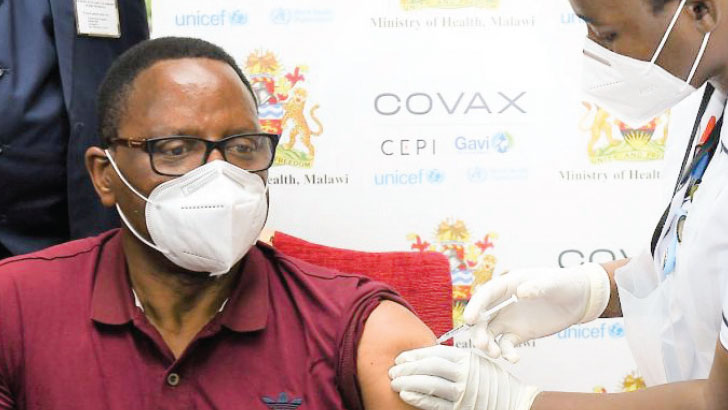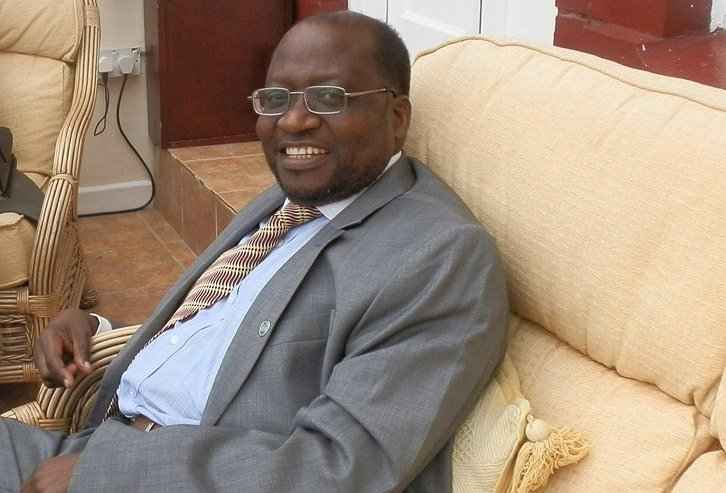Buy Covid-19 jabs—experts
Health experts have pleaded with government to consider budgeting for procurement of Covid-19 vaccines, saying depending on ‘begging’ and waiting for donations is not a sustainable way to protect the population from the pandemic.
The concern comes at a time the country is running low on the initial 512 000 jabs with Blantyre and Lilongwe district health offices announcing on Friday they had run out of stocks.

Currently, Malawi Government is banking on the yet-to-be-delivered 900 000 doses from the Covax Facility, a multi-donor initiative that mobilised the vaccines for poor countries. Delivery was due in May, but delayed due to high demand for the vaccine and India’s decision to reduce exports of the same to cater for its domestic needs.
In an interview yesterday, Society of Medical Doctors president Dr. Victor Mithi said the vaccines could be in Malawi mid-July or early August, meaning that people will have to wait that long to access the second jab or the first one in case of others.
He said: “We need to be thinking in terms of buying the vaccine ourselves because we can’t just be depending on donors when our people are dying and you also need to understand that the donors giving us will be tricky because we proved reckless from previous experience when some vaccines expired and we destroyed them.

“I have interacted with some of the international partners and their concern is that it is difficult for them to convince those who donate to us because they gave us the vaccine, [some of] it expired and we wasted it. We need to move towards standing on our own and from the word go is start investing in this issue by buying ourselves.”
On his part, epidemiologist Dr. Titus Divala reminded authorities that no other intervention has performed better than the Covid-19 vaccine.
He said for Malawi’s battle against the pandemic to be strengthened, there is need to quickly get some doses. He said the Mid-Year Budget Review in February should have included such things as vaccines and oxygen plants.
In an interview, Divala said: “It is unfortunate that in the era of Covid-19, health is getting a tiny budget from government. In a time when all is going well, health deserves no less than 15 percent [based on the Abuja Declaration], but we have allocated less than 10 percent.
“The total amount of oxygen, high dependency beds, intensive care beds and the number of health workers we have is nowhere near what we need to address the health needs of our population without considering the huge burden we get from Covid-19.”
He said he expected members of Parliament (MPs) to find sense and lobby for money to purchase vaccines amid a devastating third wave in some countries.
In a separate interview, health rights activist and community health ambassador Maziko Matemba said it is more expensive to treat Covid-19 patients than vaccinating them; hence, asked MPs to push government to allocate money in the current budget.
Malawi targets to vaccinate 11 million or 60 percent of the population with the Covax Facility providing vaccines for 3.8 million people. Government said it would mobilise seven million doses to hit at least 11 million of the population.
Matemba said Malawi needs about K40 billion for the seven million doses government promised to buy.
He said: “The best is to have a budget so that when there is a gap, it has to be filled. Covid-19 is about life and death and with increased cases, we have to be vigilant. Vaccination has proved to be effective and it has to be supported and financed to save lives.”
But National Organisation of Nurses and Midwives in Malawi president Shouts Simeza said the problem was two-fold. He blamed the citizenry for being reluctant to get the jab in the first instance.
“The government also relaxed, it waited for donors and wants to be pushed. So, they have to swallow their pride and feel that waiting for development partners to support on the vaccines has yielded us this fruit that we are running dry, we don’t have vaccines for our people,” he said.
Responding to the concerns in an interview, Ministry of Health spokesperson Joshua Malango said the Covax vaccines will arrive in July, but was non-committal on whether the ministry was considering including money for vaccines in its 2021/22 budget.
In an interview, Presidential Task Force on Covid-19 co-chairperson Dr. Wilfred Chalamira Nkhoma said the Covax Facility met four days ago and Malawi was also included as a recipient of the next consignment of the vaccine.
He admitted that even at the central level, the country has run out of the vaccine, indicating they have also noticed an increase in new cases and will be meeting on Thursday to see if more measures can be introduced.
“We asked for about 900 000 doses, but we are waiting to hear from the Covax how many of these are going to come to Malawi and when,” Nkhoma said.
In a statement on June 17, Ministry of Health Principal Secretary Dr. Charles Mwansambo confirmed that the country is experiencing stock-outs of the vaccine in many sites due to delays in arrival of the next consignment from the Covax Facility.
On the potential risks of taking longer than the prescribed 12 weeks between the first and the second jabs, Mithi said while the protection does not go down immediately, it still goes down after some time; hence, the need for the country to arrange to have the jabs.
He said: “The thing is that the longer you wait, the less protection you have from the first dose and then the coming of the second dose is to boost on the first one.”
The World Health Organisation (WHO) states on its website that “the maximum protection is not reached until 2-3 weeks after vaccination. If you have a two-dose vaccine, this means that you don’t get full immunity until 2-3 weeks after second dose”.
On its part, Gavi the Vaccine Alliance, through which Malawi is expecting another 900 000 doses of the vaccine under Covax Facility, also states the same in its June 14 update.
It states: “Immunity takes a while to build up. If you had your first Covid-19 vaccine dose yesterday, then you are not protected yet. Your body needs to spend time responding to the vaccination before it can produce an effective immune response.
“But after a longer time, we aren’t yet sure how long, this protection is likely to start to fade again. So, you will need a second booster dose to make sure your immune system can consolidate this protection for the long-term.”
Out of the 512 000 doses in the country, including 19 000 destroyed in April, by Saturday Malawi had cumulatively administered 420 685 vaccine doses.
The country continues to register more cases, as it has registered a cumulative 347 cases in the past week, comprising 249 local transmissions and 98 imported cases as well as nine deaths.





